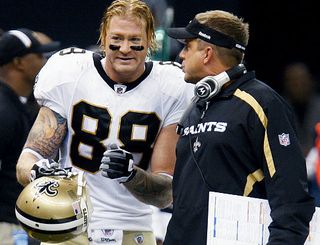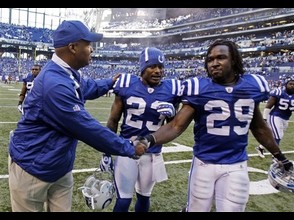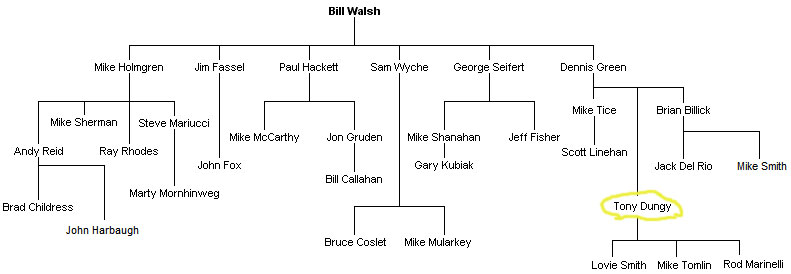We’ll finish up our discussion about Bill Walsh today. If you’re just tuning in, you may want to read the previous discussions (1, 2, 3).
This weekend is the Super Bowl. As you probably know, it will feature the Indianapolis Colts and the New Orleans Saints. What you may not know, is much about the coaches of these teams.
For both coaches, this is their first appearance in the Super Bowl. So, I would imagine they are probably more than a little nervous. When the Saints coach, Sean Payton, wanted to get the pre-game practice week off to a good start, what you do you think he did? The San Jose Mercury News reported that he followed in Bill Walsh's footsteps: 
“Sean Payton had taken a few pages from the playbook of the late coaching great Bill Walsh before. Not quite like this, though. Ever focused on the mood of his players, the Saints' head coach kicked off Super Bowl week by donning a bellhop uniform and helping with luggage when the team bus showed up at its downtown Miami hotel on Monday.
Drew Brees and the Saints' six other Pro Bowl players joined him, hoping to ease whatever tension accompanied the Saints on the first Super Bowl trip in the club's 43-year history.
'We're always wanting to steal a pretty good idea,' Payton said. 'I think Bill Walsh, a long time ago, had a pretty good idea, and we just kind of took it like one of his offensive plays and ran with it.'
When Walsh coached the 1981 49ers to the first of five Super Bowls for that franchise, he did essentially the same thing. The Joe Montana-led Niners beat Cincinnati 26-21.”
Sean Payton was primarily trained by coaching legend, Bill Parcells, in the Dallas Cowboy franchise, but with this type of stunt, do you think he has spent some time studying Bill Walsh’s methodologies? Probably a safe bet.
 What about Jim Caldwell? This is great story. Caldwell spent the first part of his career as an assistant coach at seven different colleges in the midwest. He was finally awarded the head coaching job at Wake Forest in 1993.
What about Jim Caldwell? This is great story. Caldwell spent the first part of his career as an assistant coach at seven different colleges in the midwest. He was finally awarded the head coaching job at Wake Forest in 1993.
His record at Wake Forest was dismal. Over the next eight years, he lead the team to 26 wins and 63 losses (he was 12 - 52 inside the notably weak ACC conference). I’m not sure if he got fired after the 2000 season, but I wouldn’t be surprised if he did. In 2001, he took an assistant coaching job with the Tampa Bay Buccaneers under the supervision of their head coach, Tony Dungy.
In 2002, Caldwell followed Dungy to Indianapolis, where Dungy took the helm of the Colts. Dungy lead the Colts on a remarkable run over the next seven years. Dungy compiled a record of 85 wins and 27 losses, making the playoffs every year. Additionally, the Colts won the Super Bowl in 2006.
In 2008, when Dungy announced his retirement, he named his successor as Jim Caldwell. You wouldn’t think this would be a good choice based on his track record, but Dungy had spent the previous seven years teaching Caldwell his system and felt confident that he could carry on that system after his departure.
Dungy was right. Caldwell compiled a 14 win – 2 loss record this year as a “rookie” coach. This is the best start by a rookie head coach in NFL history. It has been quite a remarkable turnaround from his performance at Wake Forest. What changed? I believe that he simply executed Tony Dungy’s system.
Any idea where Tony Dungy learned to coach? You guessed it—from those heavily influenced by Bill Walsh. In fact, many of today’s most successful NFL coaches trace their coaching philosophies back to Walsh:

So, we learned from our previous discussions that Walsh had “a magic wand” when if came to quarterbacks—anyone who played inside his system would perform remarkably better. It now also appears that Bill Walsh may have had the same effect on coaches. In the end, this speaks to the power and wisdom of the system that he conceived and perfected during his coaching career.
From a business perspective, every owner wants to build a business system that not only works (profitable) but can also be predictably duplicated (scalable). Bill Walsh did just that in the very competitive arena of professional football…not by focusing his efforts on hiring better talent, but by building a better system to plug that talent into. As described in Walsh's book, The Score Takes Care of Itself:
“Walsh was not presumptuous enough to write a book that would guarantee good leadership; rather, Walsh sought to help us understand the ways we can increase the probability of success: 'That’s what it all comes down to, namely, intelligently and relentlessly seeking solutions that will increase your chance of prevailing in a competitive environment. When you do that, the score will take care of itself.' ”
Enjoy the Super Bowl this weekend, and see if you can detect some of Bill Walsh’s legacy unfold in the action on the field.
Editor's Note: This article was written by Ben Hess. Ben is the Founding Partner and Managing Director of Tidemark, Inc. and a regular contributor to WorkPuzzle. Comments or questions are welcome. If you're an email subscriber, reply to this WorkPuzzle email. If you read the blog directly from the web, you can click the "comments" link below.




Comments